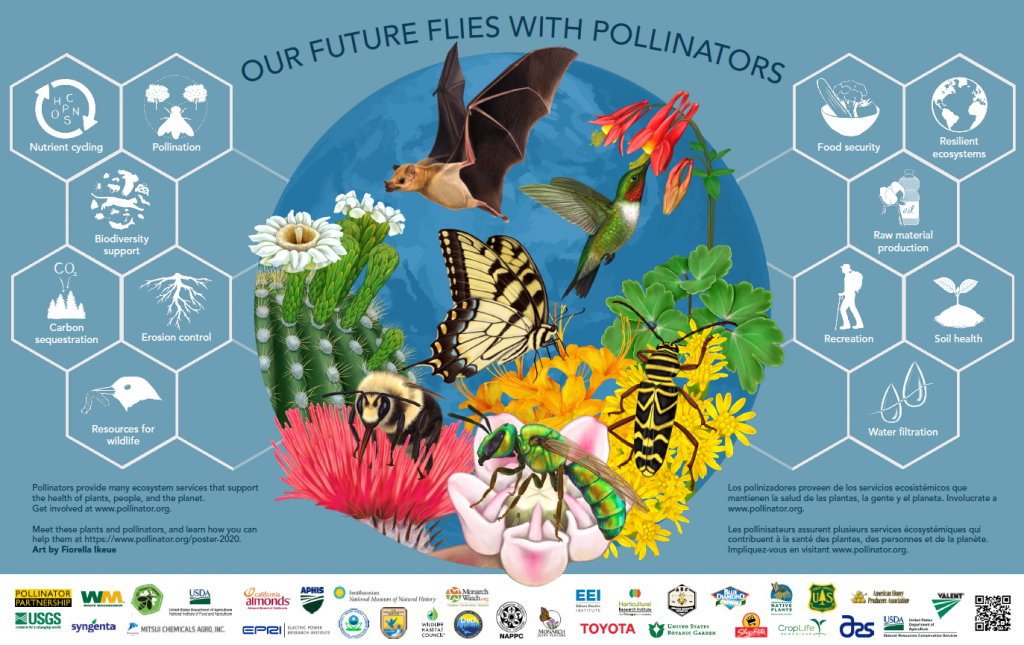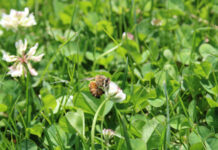
It’s National Pollinator Week, the 13th consecutive year of bringing greater awareness to the critically important issue of pollinator conservation. Pollinator Partnership (P2) founded the initiative in 2007 which has now grown into an international celebration of the valuable ecosystem services provided by bees, birds, butterflies, bats, and beetles. Landmarks across the U.S. and Canada will be lit in pollinator colors (yellow and orange) while numerous virtual gatherings, webinars, responsible planting sessions, socially distant garden and farm walks will be held. To find activities in your area, click here.
Here are some facts from P2:
- About 75% of all flowering plants rely on animal pollinators and over 200,000 species of animals act as pollinators. Of those, about 1,000 are hummingbirds, bats, and small mammals. The rest are insects such as beetles, bees, ants, wasps, butterflies, and moths.
- Worldwide, approximately 1,000 plants grown for food, beverages, fibers, spices, and medicines need to be pollinated by animals in order to produce the goods on which we depend.
- Foods and beverages produced with the help of pollinators include blueberries, chocolate, coffee, melons, peaches, pumpkins, vanilla, and almonds.
P2 offers variety of free eco-regional pollinator friendly planting guides. Simply type in your zip code here to download gardening advice specific to your area. Here are some general tips:
- Habitat opportunities abound on every landscape – from window boxes to acres of farms to corporate campuses to utility and roadside corridors – every site can be habitat.
- Utilize plants native to your area (or at the least, non-invasive for your area).
- Utilize the Ecoregional Planting Guides. Decide among the plant material options – seeds, plugs, plants or a combination.
- Know your soil type and select appropriate plant material.
- Plant in clusters to create a “target’ for pollinators to find.
- Plant for continuous bloom throughout the growing season from spring to fall.
- Select a site that is removed from wind, has at least partial sun, and can provide water.
- Allow material from dead branches and logs remain as nesting sites; reduce mulch to allow patches of bare ground for ground-nesting bees to utilize; consider installing wood nesting blocks for wood-nesting natives.
- Practice Integrated Pest Management (IPM)
- Where possible, avoid pest problems in the first place by burying infested plant residues, removing pest habitat, and planting native plants that encourage natural enemies of pests
- If you must use pesticides, read and follow ALL label directions carefully
- If you are a pesticide applicator, check out P2’s Pesticide Education Module. This training module for certified pesticide applicator educators emphasizes the proper selection, use, and application of pesticides to protect crops in an environmentally responsible manner. Included on a compact USB Drive are the following: Workbook (including lesson plans and short quizzes) for reproduction; Answer Key; 15 minute video; PowerPoint Presentation; and Applicator Feedback Form. Cost is $20 and can be ordered here.











![[VIDEO] Dickies®: Discover Workwear That’s Anything But Uniform](https://turfmagazine.com/wp-content/uploads/2023/06/1647663814-4b1a2a7742790a9b1e97a3b963477850192e1d6a9dfba9b07214a77bae25d6e3-d-218x150.jpg)






























![[VIDEO] Dickies®: Discover Workwear That’s Anything But Uniform](https://turfmagazine.com/wp-content/uploads/2023/06/1647663814-4b1a2a7742790a9b1e97a3b963477850192e1d6a9dfba9b07214a77bae25d6e3-d-324x160.jpg)